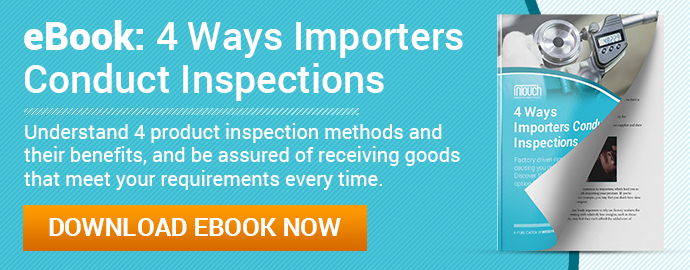 After hearing about the supply chain nightmare faced by Nestlé a couple of months ago, you might be worried that your factory isn’t compliant with SA8000 or your retailer’s standards. So you set up an audit for social compliance at the factory in hopes of getting input directly from the workers themselves.
After hearing about the supply chain nightmare faced by Nestlé a couple of months ago, you might be worried that your factory isn’t compliant with SA8000 or your retailer’s standards. So you set up an audit for social compliance at the factory in hopes of getting input directly from the workers themselves.
But what can you learn from worker interviews during a social compliance audit? What questions are asked? And how effective are these worker interviews?
Ensuring a safe environment for workers is a main goal of a social compliance audit. Among the methods used by an auditor to investigate a factory are factory walkthroughs, document review and the all-important worker interviews. It makes sense to speak with the workers themselves to get a handle on what they experience day to day at the factory.
"Ensuring a safe environment for workers is a main goal of the social compliance audit."So let’s take a closer look at this important part of a social compliance audit.
3 Common topics covered by worker interviews
As part of my personal experience observing social compliance audits, the auditor normally asks questions that cover three specific topics during worker interviews.
1. Wages
The first area investigated during the audit is typically wages. The factory will provide records of wages for review, but it is always a good idea to check if workers actually receive them or not. Questions often cover:
- How often workers get paid
- When workers get paid
- Any extra wages or compensation for Saturday, Sunday or public holidays, and
- How workers are paid (e.g. by cash or by funds transfer)
2. Hours
Worker interviews during a social compliance audit usually cover working hours. These are in addition to reviewing all signed working shift records. The auditor will ask workers questions related to:
- Hours worked in a typical day

- The number of daily shifts at a certain station
- The length of annual leave
- Monthly days of rest
- Any cases where a request for leave was rejected and for what reason, and
- Paperwork or documentation required for requesting leave
Hours are very important because many workers get paid very little and need to work overtime just to get by. An investigator looking into Apple factories in 2015 found that workers earned about $1.85 per hour and worked substantial overtime hours just to cover living expenses.
"An investigator looking into Apple factories in 2015 found that workers earned about $1.85 per hour."3. Working conditions
Worker interviews during a social compliance audit also cover working conditions. These questions will be broader and related to things like the overall feel of working in the factory and how the workers are treated. A few examples of common questions asked include:
- Are there fans in the gluing station to allow for proper ventilation?
- Are there consequences to workers that use the bathroom frequently during a shift?
- Does the factory provide social benefits?
- Is there a cafeteria or canteen for meals or equipment to heat meals if workers bring their own?
- Does the factory provide training for safely operating any equipment and machinery?
A recent investigation revealed slavery in Thailand’s seafood industry. Although slavery is an extreme case, worker interviews during a social compliance audit specifically address this by probing into working conditions at the factory. Make sure working conditions are included in the questionnaire during your audit.
"Working conditions should be included in the interview questionnaire during a social compliance audit."Management influence on the interview process
It’s clear that worker interviews during a social compliance audit are intended to reveal important aspects of the supplier’s operations. The questions asked are pertinent. And they can protect you from failing a formal audit from a retailer like Walmart.
But unfortunately, you need to take the results of worker interviews with a grain of salt. The workers will likely be notified that an auditor will be coming and may be promised bonuses if they speak well of the factory.
"The results of worker interviews during a social compliance audit should be taken with a grain of salt."Coaching workers on interviewing
In fact, Huffington Post reported some factories have been known to coach workers on the answers to provide auditors during the interviews. “Sometimes [employees] answer before you ask the question,” says Rachelle Jackson, director of sustainability and innovation at Arche Advisors, who says she’s performed about 1,500 audits. “You ask, ‘What time do you start work?’ and they say, ‘Eight hours.’”
What can you do?
Of course, as long as you’re able to pass an audit you’re retailer(s) typically won’t refuse distribution of your product. But this raises the more compelling  question of how to make sure your suppliers actually are socially compliant, instead of simply able to pass an audit.
question of how to make sure your suppliers actually are socially compliant, instead of simply able to pass an audit.
Nike has done this in some cases, by setting up model factories and sending factory managers and staff to train. But this strategy is more difficult in places like China, where worker turnover is especially high and talent comes and goes. Ultimately, it seems the only way to be absolutely sure your supplier is socially compliance is to actually own and manage the factory yourself.
Conclusion
Worker interviews during a social compliance audit remain an important aspect of investigating if your supplier is compliant with international or brand/retailer standards. An auditor will ask questions about working hours, wages and conditions to uncover whether or not local laws or standards are being violated at the factory.
But it’s important to understand that the efforts of worker interviewers can be thwarted by factory management. It’s not uncommon for workers to be coached on how to respond to questions and to be alerted when an auditor will come to the factory. This is a difficult problem to tackle, especially for smaller importers from abroad.
Still, a social compliance audit remains one of the best ways to investigate your supplier. And such an audit relies on more than worker interviews alone. Make sure that you’re carrying out social compliance audits according to the standards provided by your retailers.







